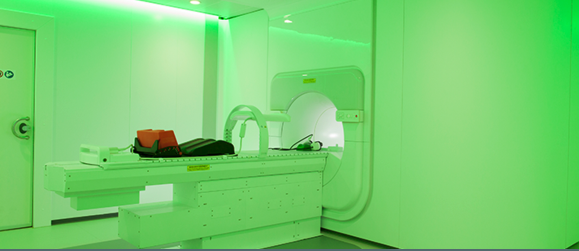Royal Marsden and Institute of Cancer Research deliver new treatment using ground-breaking technology
Barry Dolling, from Surrey in the UK, has been the first cancer patient to receive pioneering new treatment, thanks to the work of scientists funded by the Medical Research Council. The treatment was delivered at the Royal Marsden and is part of the PRISM clinical trial project, the first of its kind in the United Kingdom.
Barry’s radiotherapy was delivered using a Magnetic Linear Accelerator (MR Linac) machine. It simultaneously generates magnetic resonance images and delivers X-ray radiation beams which allows radiotherapy to be adjusted in real time - meaning that the treatment is delivered in a way that is more accurate and effective than ever before. The MR Linac machine is the first technology in the world to function in such a way.
The form of treatment should reduce the side-effects patients often experience and the very specific targeting of tumours will be particularly effective for cancers that change position through bowel changes, bladder filling and breathing - including tumours in the prostate, lung, bladder and bowel.
First patient in the UK receives pioneering new form of radiotherapy https://t.co/baZD4uHKdk @ICR_London @royalmarsdenNHS pic.twitter.com/dJyHohGemV
— The MRC (@The_MRC) September 25, 2018
Barry was diagnosed with prostate cancer earlier this year and was deemed suitable for this new treatment. This clinical trial will see him receive daily treatment for the next twenty days.
Speaking about his treatment, he said: "I was really excited to be the first patient to be treated with the MR Linac. I jumped at the chance to sign onto the PRISM trial as I believe the treatment will give me a better quality of life and minimal side-effects in comparison to other treatments. It is nice to know that my treatment will help research treatments for cancer patients in the future."
Professor Uwe Oelfke, Head of the Joint Department of Physics at the Institute of Cancer Research, London, and the Royal Marsden, who leads the joint MR Linac project, said: "For decades the radiation oncology community has dreamed of the day when we could see what we treat in real time just as our surgical colleagues do, and we are excited that this day has arrived.
"Radiotherapy is important to the treatment of around 40 per cent of the people who are cured of cancer. But if we want to fully unlock the potential of radiotherapy by making it even more precise in targeting the cancer and avoiding healthy tissue, we need to be able to see a patient’s tumour while we deliver the radiation treatment. The MR Linac will make this possible."
This ground-breaking treatment has been in development since 2012 and has involved a team of many, including researchers and developers from Utrecht Medical Centre and the company Elektra, who manufactures the MR Linac.
The Institute of Cancer Research received a £10 million grant from the Medical Research Council and additional support from the Royal Marsden Cancer Charity, to make the installation of the MR Linac possible. Scientists have also received funding from Cancer Research UK, Stand Up To Cancer and the NIHR Biomedical Centre at the Royal Marsden.


Comments